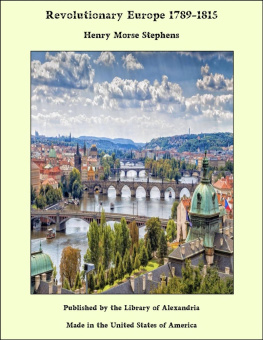CHAPTER I. THE PEOPLE AND THE OLD RGIME
..................
THE CLOSE OF THE SEVEN Years War brought only a lull in the great conflicts of the eighteenth century, and yet for a time men seemed less influenced by dynastic quarrels, and their attention was centered upon questions of social and political reconstruction. The policies of rulers were affected by these newer interests. They tried to make an end of crying abuses, or at least to simplify their administrative systems and to remove troublesome obstacles to the exercise of their authority. In the last years of the century the timid plans of monarchical reform in France were thrust aside by a popular revolution which aimed to reorganize society according to the principle of equality. The same principle of reorganization was carried beyond the ancient frontiers of France when war broke out and victorious French armies sought to enlarge the borders of the nation or to impose the national institutions upon dependent peoples. Before the period closed with the downfall of Napoleon and the settlement of 1815, these two forces of monarchical reform and revolutionary action had worked many changes in the structure of European society.
No brief description of the characteristic features of the old rgime can be made altogether satisfactory, because within the limits of a single country, or even of a province, there existed such baffling diversity. Although the proportions of truth are difficult to fix, the impression grows irresistible that the classifications of men in the eighteenth century were outworn, rigid, and unfair, and that those who labored on the farm or in the shop were seriously hampered by restrictions laid upon them by law and custom. When Rousseau declared in 1762 that Man is born free and is everywhere in chains, the second part of his statement was sufficiently exact in the economic and the larger social sense. The population of Europe was still mainly rural and its principal occupation was agriculture. Nine-tenths of the French people lived in the country or in small towns. Lyons was the only city besides Paris which had over one hundred thousand inhabitants. In Germany Berlin had just passed the one hundred thousand mark. Birmingham and Manchester, the great manufacturing centers of England, which now have a population of over five hundred thousand, had about thirty thousand. The inventions which created the modern factory system and have filled the towns with throngs of artisans had not been made. Industry was carried on much as it had been for generations.
In the country there were only two classes, lords and peasants. A middle class hardly existed except in England. In some parts of Europe the relations of lord and peasant were as primitive as on an English or French manor of the twelfth century. In Hungary the peasant could not even own land. He was in a sense the property of the noble and his rights were not recognized by law. Within the kingdom of Naples it is said that a thousand kinds of feudal dues might still be levied. Even where, as in France, a new social order had for centuries been displacing the feudal system, feudal survivals were apparent on every side in the structure of rural society. Nor was it a question merely of quitrents and other dues. The possession of a noble estate usually carried with it some governmental authority. The lord might be to all intents and purposes a petty sovereign or he might retain merely shreds of his former powers. Absolute rulers did not always interfere with the local sovereignty of their nobles. The kings of Prussia, for example, did not venture to curtail the powers which the lords exercised over their peasants.
Many of the nobles in France could hardly be said to belong to the rural population, because they usually resided in Paris or Versailles. They found life far from the sunshine of royal favor unendurable, and many of them could not pay their expenses without the aid of gifts and pensions. The religious wars of the sixteenth century had uprooted them from the soil, and Louis XIV had sought to increase the splendor of his Court by insisting upon their presence. He also hoped in this way to cure them of the rebellious mood into which they had fallen during the regency of Marie de Medici and during the Fronde.
By the middle of the eighteenth century the court nobles formed a class of absentee landlords. Their estates were left in the hands of stewards, whose success was measured by the amount of dues they extracted from the peasantry. The ideal of efficiency appealed to these stewards as to the other administrative officials of the time. They examined the seigniorial records containing statements of rights of lord or peasant in forests and common lands and of the dues which the peasant owed, in order that no part of their masters heritage might be lost by neglect or through patriarchal tenderness in enforcing collection. It seemed as if a feudal reaction were taking place.
Still later in the century a fashion was adopted which promised to correct the evil of absentee landlordism. The nobles imitated the English custom of spending several months every year in the country. Arthur Young, the English traveler, noted in his journal in September, 1787, that at this time of the year and for many weeks past, Paris is, comparatively speaking, empty. Everybody that have country-seats are at them; and those who have none visit others who have. This remarkable revolution in French manners is certainly one of the best customs they have taken from England. The change, however, came too late to give the greater nobles any firm hold on the affections of the people or any large influence in local affairs.
Among the lesser or provincial nobles there were many who lived habitually on their estates, absorbed by the cares of country gentlemen. The Marquis de Mirabeau, the father of the more famous Count de Mirabeau, was one. These nobles were not rich, but neither were they poor. They were on good terms with the peasants, and if their position in the community was not altogether satisfactory, it was through no fault of their own. There were also many nobles whose income raised them scarcely above the situation of the neighboring peasants. Arthur Young heard of nobles in southern France who were obliged to live on twenty-five louis a year. In 1789 several Poitevin nobles came to their electoral assembly dressed as peasants and without money enough to pay their bills at the inn.
The nobles position was weak because his powers as seignior, mere remnants of what he once possessed, made him the principal creditor of his community, rather than its ruler, and, thereby, its natural leader and protector. The seigniorial court, where once the noble dispensed justice as a sovereign without appeal, possessed only a shadow of its former authority. The cases brought before it were chiefly fiscal, disputes between the seignior and the peasants about rights and dues, the obligations of lord and tenant. Other services which the medieval noble had rendered to the community had suffered a similar transformation. He had caused a mill to be built, and had provided a wine-press and a bakery or public oven. He also maintained a market and was often responsible for the local roads and ferries. Now these services had become privileges, giving him the sole right to let the contracts for grinding grain, pressing grapes, and baking bread. In his name tolls were charged on the roads and at the ferries and dues in the market-place. It was as seignior again, not as landlord in the narrow sense, that the noble could levy a cens or quitrent and other dues upon the peasant owners or renters of land within his jurisdiction. All these rights he prized as the basis of his social superiority. He would not have consented to abandon them for a sum equal to the capitalized value of their annual revenue. As the royal government did not usually entrust him with local administrative duties, he had little or no opportunity to gain political leadership. His social position and his financial privileges, therefore, lacked the ordinary means of defense.














